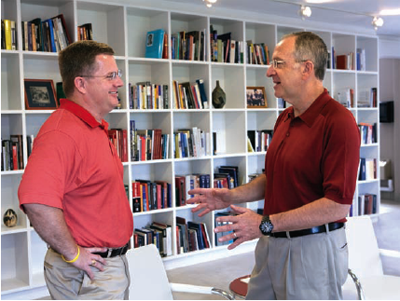
Few relationships are as important to me as those with Cornell alumni. I enjoy the conversations we've had through this column and the feedback you provide, and I continue to be impressed by the superb leadership within the Division of Alumni Affairs and Development. I recently had a great conversation with Chris Marshall, our new associate vice president for alumni affairs. Here's an excerpt:
David Skorton: How do Cornell alumni compare with those of other schools in terms of alumni activity?
Chris Marshall: There are few—if any—other universities that can claim alumni as loyal as Cornell's. That loyalty translates into involvement on many levels, from simply reading the alumni magazine or the e-news, to attending events, to volunteering for the admissions network, class councils, and regional club boards, or to contributing their financial resources.
DS: For many years, Cornell has emphasized undergraduate classes and regional clubs in creating alumni programs. Are there other, better ways to connect with alumni and link them with each other?
CM: Absolutely! The concept of affinity programs is already alive and well at Cornell—Cornell Entrepreneur Network, Cornell Silicon Valley, PCCW, and Mosaic events, to name just a few. We just need to turn up the volume a bit. By "affinity" I mean any group that can connect alumni to Cornell and each other— colleges, majors, athletics, Greek life, and music are all good examples. Or it could be via professional interests—career programs are a hot trend in alumni relations, and Cornell needs to be fully in the game. We need to organize our programs and events around entities that are meaningful to our graduates. DS: More and more communication, especially among young alumni, is being done on the Internet. What can Cornell do to use technology to better serve its graduates?
CM: Frankly, we're behind in this area. Before I even started in this position I began looking at software solutions that can help us provide a true online community to our graduates: a searchable online directory; an event management tool for online registration and payment for events; a comprehensive suite of services including class notes, affinity group notes, and social networking. It will take some time to pull all this together, but look for it in early 2009.
DS: There are many alumni who are not actively involved, yet could become so with just a nudge. Based on your experience, what's the best way to do this?
CM: We do a really good job of connecting with our alumni from the Thirties, Forties, Fifties, Sixties, and most of the Seventies—but as we get to our more recent graduates, there is a visible downward shift in involvement. Our younger alumni have the biggest need for that nudge. If, for example, we send a young alumna a reunion invitation through the mail to her home address, we're missing the boat on three fronts: 1) Young alumni prefer electronic communication—Facebook, LinkedIn, text messages, instant messages, and e-mail. 2) Many of the addresses in our database are outdated. Young alumni, generally speaking, are not all that interested in keeping Cornell up to date about where they live and work. 3) Class reunions don't appeal to young alumni. The percentages speak volumes: Cornell averages around 14 percent reunion attendance—and, nationally speaking, this is a very good result— but affinity group reunions routinely attract 50 to 60 percent attendance. We need to augment and enhance our reunion program to include this affinity concept.
DS: How do you measure the success of alumni programs? CM: For a long time, alumni relations has been considered more of an art than a science. I don't buy that. I was a collegiate swimming coach for twelve years; we measured our success to the hundredth of a second, and at the end of the day we had a scoreboard that told us how we did. That same concept must be applied to alumni affairs. We're going to measure everything! There are more than 200 data points that we will measure annually, track over time, and compare to our peer institutions. We should also ask our alumni how we're doing, so every four or five years we'll conduct an attitudinal study to take their pulse. Without that feedback, we'll just be spinning our wheels. Of course, not all feedback is quantitative. Some of the best comes from just listening to alumni. I plan on getting out there, meeting them, and hearing firsthand how they feel about Cornell.
— President David Skorton
david.skorton@cornell.edu


